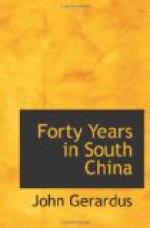But, it may be asked, if the native members so far outnumber the foreign, of what avail is it that missionaries be more than advisory members? We answer: If we are in Tai-hoey as a foreign party, in opposition to the native members, even advisory membership will be of no avail. But if we are there in our true character, as we always have been, viz., as Presbyters and acting pastors of churches, part and parcel of the church Judicatories, on perfect equality and in full sympathy with the native Presbyters, our membership may be of much benefit to Tai-hoey. It must be of benefit if our theory of Church Government be correct.
Of the benefit of such membership we give one illustration, equally applicable also to other forms of government. It will be remembered that assemblies conducted on parliamentary principles were unknown in China. By our full and equal membership of Tai-hoey, being associated with the native members in the various offices, and in all kinds of committees, the native members have been more efficiently instructed in the manner of conducting business in such assemblies, than they could have been if we had only given them advice. At the first, almost the whole business was necessarily managed by the missionaries. Not so now. The missionaries still take an active part even in the routine of business, not so much to guard against error or mistake, as for the purpose of saving time and inculcating the importance of regularity and promptitude. Even the earnestness with which the missionaries differ from each other, so contrary to the duplicity supposed necessary by the rules of Chinese politeness, has not been without great benefit to the native members. Instead of there being any jealousy of the position occupied by the missionaries on the part of the native members, the missionaries withdraw themselves from prominent positions, and throw the responsibility on the native members, as fast as duty to Tai-hoey seems to allow, faster than the native members wish.
We now proceed to give answers to the definite questions propounded to us, though answers to some of them have been implied in the preceding remarks. We combine the questions from different sources, and slightly change the wording of them to suit the form of this paper, and for convenience we number them.
1. “Are the missionaries members of Tai-hoey in full and on a perfect equality with the native members?”
Answer. Yes; with the exception (if it be an exception) implied in the answer to the next question.
2. “Are missionaries subject to discipline by the Tai-hoey?”
Answer. No; except that their relation to Tai-hoey may be severed by that body.
3. “Is it not likely that the sooner the native churches become self-governing, the sooner they will be self-supporting and self-propagating?”




